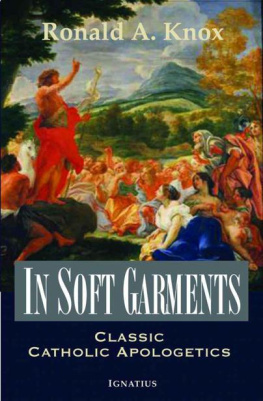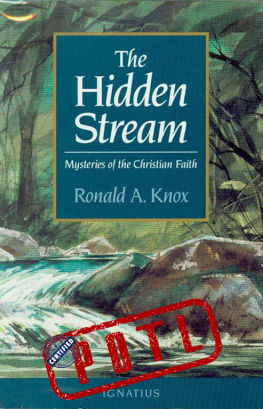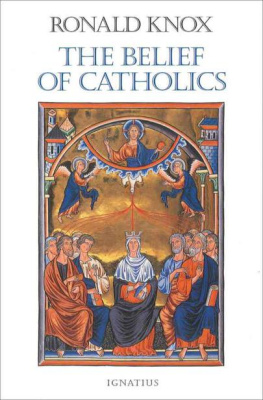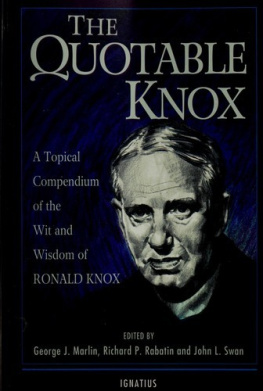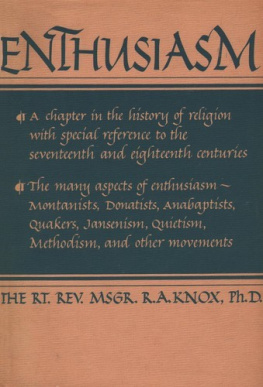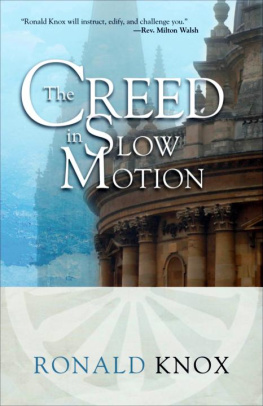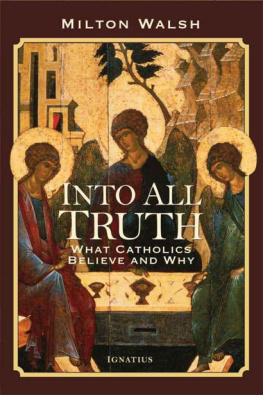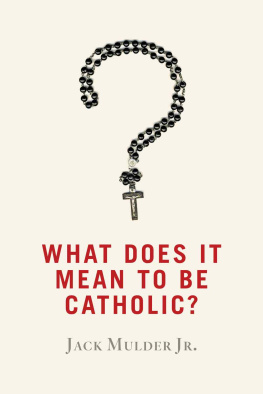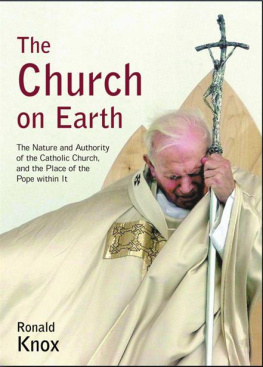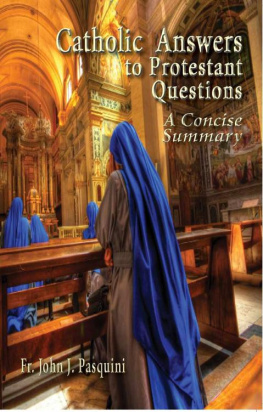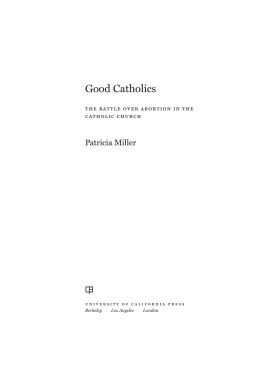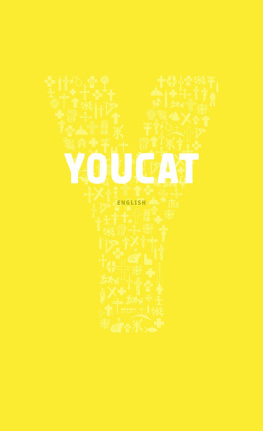IN SOFT GARMENTS
RONALD KNOX
IN SOFT
GARMENTS
A Collection of Oxford Conferences
IGNATIUS PRESS SAN FRANCISCO
NIHIL OBSTAT: THOMAS E. BIRD, S.T.D.
CENSOR DEPVTATVS
IMPRIMATVR: + THOMAS
ARCHIEPISCOPVS BIRMINGAMIENSIS
BIRMINGAMIAE: DIE VIII NOVEMBRIS MCMXLI
Original English edition:
1942 William Clowes and Sons, Limited, London and Beccles
for Burns and Oates and Washbourne, Ltd.
London
Cover design by Riz Boncan Marsella
Cover art: Giovanni Battista Gaulli (1639-1709)
Saint John the Baptist Preaching in the Desert
Runion des Muses Nationaux / Art Resource, N.Y.
2010 by Ignatius Press, San Francisco
All rights reserved
ISBN 978-1-58617-300-5
Library of Congress Control Number 2009934933
Printed in the United States of America
To
GERVASE MATHEW
of the Order of Preachers,
for whom this book contains nothing new.
CONTENTS
FOREWORD
Milton Walsh
In his Preface to this collection of essays Ronald Knox commented, I have only altered the text where it contained topical allusions which might baffle the uninitiated reader. Such consideration seems not to have extended to its titlewhatever was he referring to by the words In Soft Garments ? The Catholic Chaplaincy at Oxford is housed in a building known as the Old Palace because it had served at one time as the residence of the Anglican Bishop of Oxford. The first of these prelates was Robert King. So, Ronald Knox is alluding to where he lived when he wrote these conferences, taking for his text the words of Our Lord: They that are clothed in soft garments, are in the palaces of kings (Mt 11:8).
From 1926 to 1939 Knox served as Chaplain to the Catholic undergraduates at Oxford; one of his duties was to give the students regular conferences about the faith. Most of these students had come from families that were very committed to the Catholic faith, and many would have attended Catholic schools. By coming to Oxford they were entering a milieu that was antagonistic to religion in general and Roman Catholicism in particular. Knox pictured his charges as lambs in the midst of wolves: Wolves in sheeps clothing if you like; wolves in Old Etonian ties and so on, but wolves for all that (p. 220). It was his job to help them defend their faith on two fronts: on the one hand, from the attacks of secular thinkers who viewed religion with contempt, and on the other hand, from the seductive charms of Oxford itself, which Knox once described as the paradise of Anglicanism. It is not uncommon for students to question, or even jettison, the religion of their childhood when they go off to college; in these conferences Knox dealt with their very real struggles in this regard.
Ronald Knoxs engagement of these questions was shaped by his experience: in his own undergraduate days he had thrown himself into debates about the Christian religion vis--vis the increasingly secular worldview espoused in academic circles; and the great internal struggle that eventually led him to leave his beloved Anglican communion and become a Roman Catholic enabled him to help his young flock to see the unique claims of the Catholic Church in a new light. He also dealt with these matters in numerous books and essays written during the years of his chaplaincy, but it was in the talks contained in this book that he gave his most sustained attention to the basic issues of the Catholic faith.
Knoxs approach was also influenced by the way Catholic apologetics were presented in the first half of the twentieth century. In effect, they were shaped in reaction to two monumental movements in Europe: the Reformation and the Enlightenment. The Catholic interlocutor would seek to demonstrate on the basis of reason alone that God exists, that by his words and deeds Jesus Christ showed himself to be the fullest revelation of this God in human history, and that the Catholic Church was established by Christ for the purpose of safeguarding and handing on the revelation he brought to the world. One of the finest examples of this classical approach is Knoxs own The Belief of Catholics , written at the same time he gave these Oxford conferences. Indeed, while In Soft Garments can be read on its own, it also provides an interesting commentary on the points Knox makes more succinctly in the first half of The Belief of Catholics . Conferences 1-4 deal with the question of the existence of God; 5-8 with the claims of Christ; 9-15, with the role of the Church in handing on Christs revelation throughout history. Knox argues that the Catholic position on such questions is credible , but he also makes this very important point: But is faith merely an intellectual calculation? It cannot, obviously, be that; faith is a virtue, and there can be no virtue in making a mathematical computation; faith is a quality that is more vivid in some Christians than in others, and there could be no such difference of degree if nothing more were demanded of us Christians than a bare intellectual assent (pp. 108-9). Faith in Christ is, or should be, something that completely alters our lives, that exercises the kind of influence that only a powerful personality, a sound philosophy, or a great cause can have on us. The conferences in the second half of the book explore this great love from different angles. In these talks Knox not only provides an intellectual foundation for the faith we profess; he examines its repercussions in our daily lives.
In Soft Garments was not Ronald Knoxs last word on these subjects. Ten years later he published another set of Oxford conferences entitled The Hidden Stream . These talks were given on occasions when he returned to the Catholic Chaplaincy as a guest speaker. If The Belief of Catholics finds itself on one side of In Soft Garments on your bookshelf, The Hidden Stream can rest very companionably on its other side. It is instructive to compare these volumes, written not many years apart; the latter book is marked by the same intellectual clarity and imaginative expression found in In Soft Garments , but changing circumstances cause new facets to shine.
Perhaps the title In Soft Garments contained a mild self-rebukethe priest at the cozy Chaplaincy recognizes that he is no John the Baptist. While it would be fantastic to picture Ronald Knox in later life as a fiery, prophetic figure, it is true that events in the world around him, particularly the carnage of the Second World War, challenged him to reexamine the implications of the faith he still so forthrightly professed.
In the years following the publication of The Hidden Stream Knox gave much thought to attempting a new approach to apologetics. He imagines someone asking, Why shouldnt perplexities be resolved by a time-honoured formula from the Catechism? and he answers: I know; it is all utterly preposterous; they ask us for a plain answer to a plain question, and then object to our plain answer because it is not a coloured one. But there it is; our answers seem too glib, too slick; there is something machine-made about them. By comparing Knoxs talks in his two collections of Oxford conferences the reader gets a sense of the trajectory he was following, and some presentiment of how rich his new apologetics might have been. But these sets of conferences have much in common that is perennial; furthermore, the approach he takes in In Soft Garments may meet our needs at a given time better than the later conferences do.
Apart from particular insights gleaned from this book, there is a breadth of vision that marks Knoxs writings as a whole, and this makes them both a consolation and a challenge to us. The contemporary demand for, and impatience with, the plain answer has reduced so much of our discourse to the sound bite and the bumper sticker. Here is how Knox expressed the situation:
Am I suggesting that we should haul down the flag of intellectualism? That we should appear in the eyes of our fellow-countrymen simply as one of the denominations, canonized by the antiquity of our institutions and the richness of our culture, but not laying claim, or not manifestly asserting our claim, to possess a more closely reasoned intellectual system than the others? If such a gesture were possible, I would be the last to suggest it. An unintellectual salvation (the phrase, I think, was Philip Waggetts) means an unsaved intellect; and if muddle-headedness is a mood of our age, and a vice of our fellow-countrymen, we, whose traditions are agelong and world-wide, are committed to an attitude of protest. Even for the sake of Christianity at large, we dare not betray, by silence, what is part of our characteristic witness. No, intellectual propaganda we must have. I only question whether we do not spoil the effect of our intellectual protest by isolating it too muchserving it up, as it were, under a separate coverfrom that moral and spiritual witness which, as Christians, we do not cease to bear.
Next page
